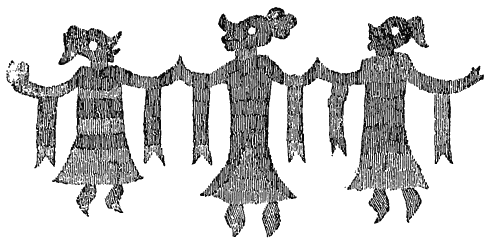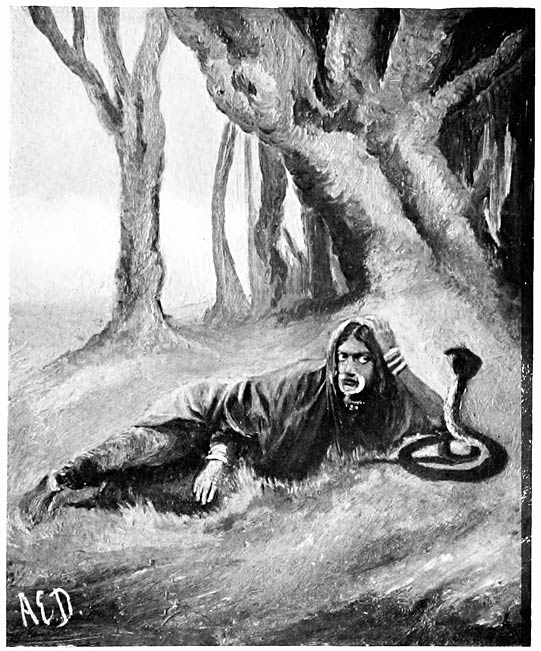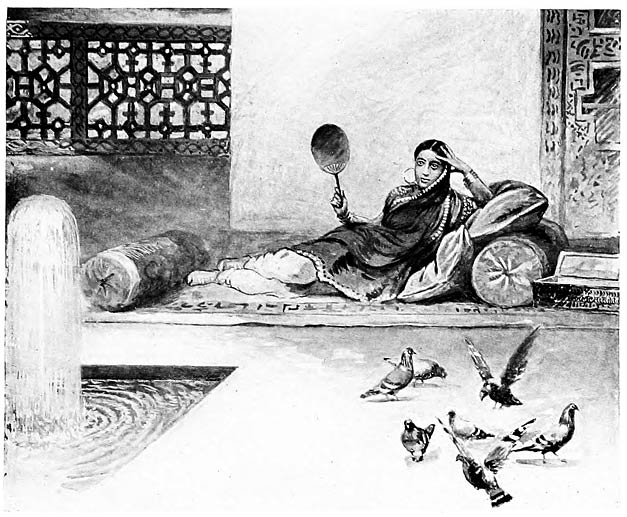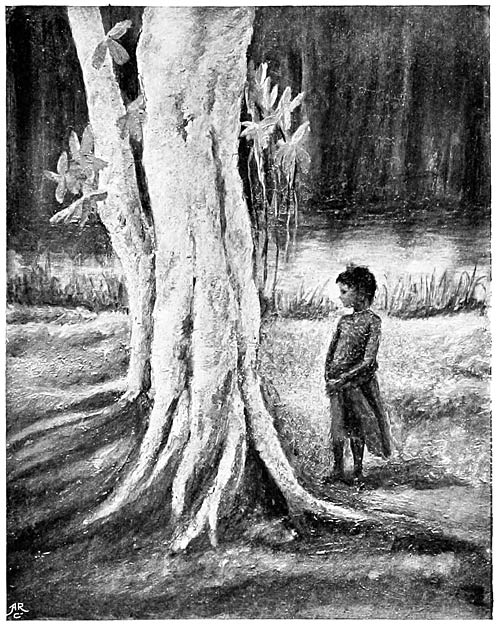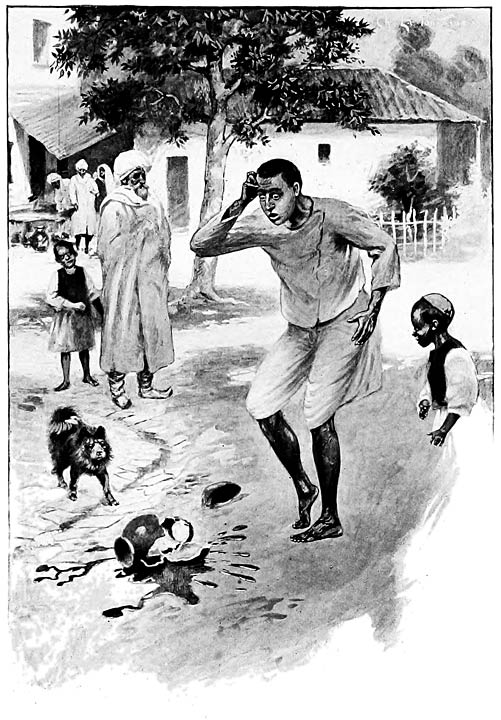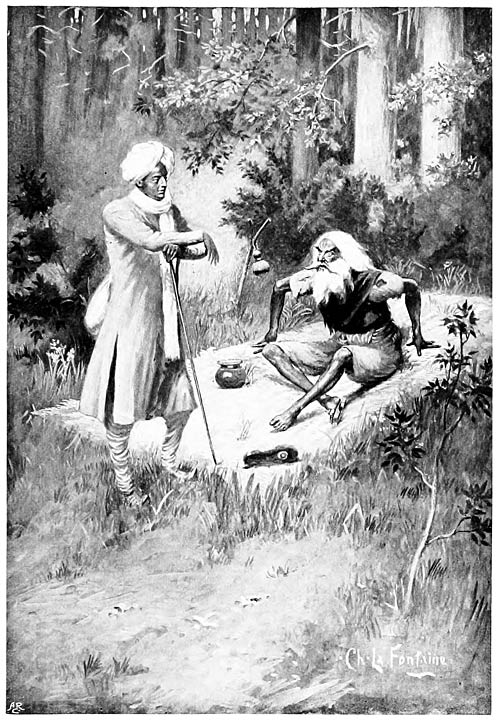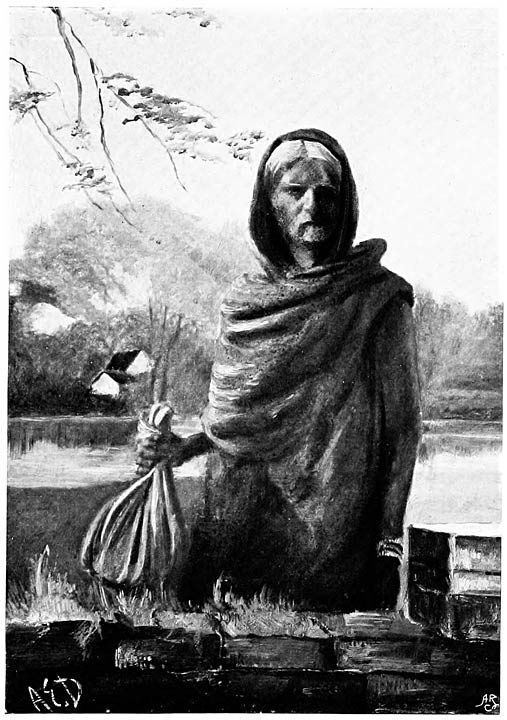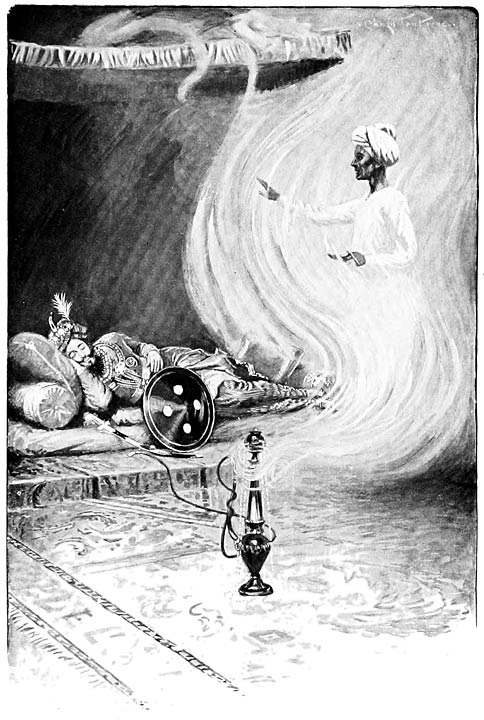There was once a Prince who used to amuse himself by dressing as a poor man, and going
about amongst his subjects without their finding out who he was.
In this way he found out all that they did, and how they lived.
Once, while walking through a gully, he saw three sisters, and overheard their conversation.
One said: “If I could marry even a servant of the Prince, how happy I should be! I
should eat sweets and all sorts of nice things all day long.”
The other sister said: “I’d rather marry his cook, for then I should get still better
things.”
But the third sister said: “I’d like best to marry the Prince himself, for then I’d
get the best things of all to eat.”
[201]
The Prince went home, and next day, while holding court, gave an order that these
three sisters should be brought to him.
The order was immediately carried out, and, as the three trembling girls stood before
him, they wondered much why they had been summoned.
“Now,” said he, “tell me what you three were talking about last night?”
Terribly alarmed, the eldest confessed that she had said she would like to be the
wife of one of the servants, so as to get nice things to eat. The second said she
had wished to be the wife of his cook.
The third sister hesitated, and then said timidly that she had dared to say she would
like best to be the wife of the Prince himself.
On this the Prince said: “You may have your wishes.”
He then ordered the one to be married to one of his servants, and the other to his
cook; but the third he married himself.
Some time after this, a son was born; but his wife’s two sisters, who had begged to
be present upon the occasion, and who were [202]very jealous of their sister’s position, quietly removed the baby, and put a dog’s
puppy in its place. The baby they put into a box and flung into the river.
Now the Prince’s gardener found the box and opened it; and, when he saw what it contained,
he was overjoyed, and took the child to his wife, telling her that God had at last
given her a son which he would keep and bring up as his own son.
Meantime, the Prince was very angry indeed, but forgave his wife at the request of
her friends.
Some time after this another son was born, which the sisters changed for a kitten,
and, putting the babe into a box, threw it into the river as before; but again the
gardener found the child and carried him to his wife.
Yet a third child was born to the Princess, a little girl, which the two sisters changed
for a rat. As before, they placed the child in a box and threw it into the river;
and yet a third time did the gardener rescue the babe, and take it to grow up with
its two brothers, his adopted boys.
By this time the Prince was very angry with his wife, and turned her out of his house.
[203]
The gardener and his wife, who had loved their adopted children very dearly, died
when the boys were about eight or nine years of age.
So the boys begged the Prince to give them land of their own, on which to build or
cultivate; and he, remembering how fond his gardener had always been of them, granted
their request, so they lived there very happily with their little sister.
The brothers often went out hunting, and on one occasion, when they were out and their
sister alone at home, a very old woman came to her and begged for some water. She
willingly gave it, and then asked the old woman very kindly if she would not come
in and rest. “Come and see my house,” she said, “and tell me what you think of it.”
The old woman said: “You have everything very nice, but there are three things which
you have not got.”
“And what are those?”
“You have no bird, no music, and no stream of water,” replied the old woman; “without
these your house is nothing.”
“Where am I to get them?”
[204]
“You must go to the West.”
So saying, she went away and left the girl very sad, for she wished for the three
things without which her home was incomplete.
On the return of her brothers, they asked her why she looked so sad; and she told
them of the old woman’s visit, and what she had said.
“If that is all,” cried the eldest brother, “I will go and bring you all three things.”
The sister at first cried very much, and begged of him not to go, but at last she
consented; and as he bade her good-bye, he gave her a string of beads, saying: “As
long as I am well, these beads will be separate from each other; but should any misfortune
overtake me, or I should die, the beads will be no longer separate, but will be joined
together.”
Then he mounted his horse and rode away.
On the way he met an old Fakir. This old man’s face was covered with hair, so that
he could not see, and he had a very long grey beard.
The boy looked at him, and said: “Let me shave you, and you will be able to see better.”
So the Fakir allowed himself to be shaved, [205]after which he asked the youth where he was going, and on hearing, he advised him
not to go. “For,” said he, “many have already gone on that quest, but have never returned.”
Yet the boy persisted. So the old Fakir gave him a ball, and said: “Keep throwing
this before you as you go. Stop where the ball stops, and heed no sounds or interruptions
on the way.”
The ball went in the direction of a high mountain, and the boy followed; but in the
mountain there were strange hissing sounds and voices all around, which kept shouting
to him, and asking who he was and where he came from.
He paid no heed to these, until suddenly there came a great clap of thunder, followed
by an earthquake. This so startled the boy that he looked round, and in a moment was
turned into stone.
The poor little sister at home, discovering that she could no longer separate her
beads, was grieved indeed, knowing that some harm had befallen her brother; and she
wept bitterly.
On this her second brother said he would [206]go and seek him, and also find the three things she required for her house.
His sister implored him not to leave her, for he was all she had left; but he was
determined, so she was obliged to reluctantly consent to his going.
Before leaving he gave her a flower, and said: “Sister, as long as this flower keeps
fresh, you will know that I am alive and well; but if it should close or fade, you
may feel sure that I too am dead.”
Then he mounted his steed and started on his journey.
Soon he met the old Fakir, who warned him as he had warned his brother, saying: “My
son, so many have gone on this quest and have lost their lives; your own brother has
lost his life, and yet you wish to go. Turn back, I advise you.”
“No,” said the boy, “I am determined to find my brother, and also the bird, music,
and stream of water.”
Then the Fakir gave him also a ball of string, with the same directions which he had
given his brother; and he continued on his journey.
As he reached the hill, he too heard the [207]same hissing, shouting, and cries to stop; but he heeded nothing, until at last came
the peal of thunder and earthquake, which so terrified him that he turned round to
look, and he too was turned into stone.
At home his poor sister saw her flower fade away and die, and then she knew that her
other brother had also come to an untimely end.
So she arose and locked her door, and said: “I will go myself and find my brothers.”
On her way she met the same old Fakir, who accosted her, and asked her whither she
was going.
He was much grieved when she told him her story, and said: “Brave men have lost their
lives, and you, a woman, without half their strength, are going. I pray you be advised
and return.”
“No, no,” she returned; “if men have lost their courage, I, a woman, shall not lose mine. I am very brave, and I mean to go.”
So the Fakir bade her God-speed very sadly, and gave her the same parting gift as
he had given her brothers, directing her what to do with it.
The first thing she did was to buy some [208]cotton wool, and with it stop her ears, so that she could not hear a sound; then she
proceeded on her journey up the hill.
The same sounds followed her all the way, but she heard them not, nor did she hear
the thunder or heed the earthquake in her anxiety to find her brothers.
On and on went she, until she saw a cage hanging on a tree, and in it a bird. She
took it with great joy, and said: “I have found my bird, and have only the music and
water to get for my home to be perfect.”
To her delight, the bird heard, and replied: “If you break off a branch of that tree
and stick it into the ground, the breeze through its leaves will make the sweetest
music you have ever heard; and if you will take a little water from that enchanted
stream yonder, and pour it into your garden, it will never cease to flow. Thus you
will have both music and stream.”
The girl did as the bird advised, and heard the sweetest melody in the branch of the
tree. Then she filled a vessel with water and prepared to return, but very sorrowfully,
for she had found both her brothers turned into stone.
[209]
She told her trouble to the bird, who said: “Sprinkle some of the water on the stones.”
This she did, and, to her great surprise, both the lads came to life.
They were delighted to see her, and to know that she had succeeded in finding the
gifts they had failed to get; and the three returned home and lived very happily together
for some time.
One day the two brothers thought they would like to go out hunting again.
Now they did not know that an order had been passed that nobody was to hunt in that
forest except the Prince, and, while they were there, they came face to face with
the Prince himself. This alarmed them, and they tried to hide themselves; but he called
them, and enquired why they were hunting there against orders.
Then they explained that they were in ignorance of his orders when they came, and
begged forgiveness.
The Prince, pleased at their appearance, enquired who they were, and they said: “The
adopted sons of your gardener who died some time ago. Our own parents died when we
were young.”
[210]
Then the Prince invited them to his Palace, but they said they could go nowhere without
first telling their sister.
“Well, ask your sister,” said he, “and come to-morrow.”
On the third day they met the Prince again, and he asked why they had not come; but
they pleaded as an excuse that they had forgotten to ask their sister. The Prince
then gave them a golden ball and said: “When you see this, you will remember.”
That night as they were going to bed, the small golden ball rolled out on the floor,
and seeing it, they remembered, and told their sister of the Prince’s invitation.
She was very displeased with them for not having complied with it earlier; and told
them that they must go and see him the very next day.
On the morrow the two boys went to the Palace, where the Prince received them very
kindly, and gave them all sorts of good things to eat and drink, saying to himself:
“Had I had children, they would by this time be the same ages as these lads.”
One day, soon after this, the bird advised [211]the sister of the boys to invite the Prince to dinner.
“How can I entertain so grand a man?” said she.
“Make him a dish of kheer (rice cooked with milk and sugar); and besides this, to please him, another dish
of pearls.”
“But where shall I get the pearls?”
“Send a man to dig beneath that tree, and you will find as many as you require,” replied
the bird.
So the girl did as she was told, and sent a man to dig. He soon found a box full of
pearls, and these she placed in a very beautiful dish, and put it alongside the plate
of kheer.
The Prince accepted the invitation to dinner, and came to the house.
After showing him all round, the girl led him at last to the room in which she had
prepared dinner; and as her bird was also there, she told it to make a salaam to the Prince, which it did.
Then the first dish was uncovered, and the Prince knew that he could not eat it as
it was made of pearls; but the bird spoke up and said: “O Prince! are you not yet
able [212]to understand the difference between pearls and dross? When your wife bore your children,
you believed them to be dogs, cats, or rats, and turned out your poor wife, who was
in reality the mother of these”—and she pointed to the two boys and their sister—“your
own children, who were exchanged by their wicked aunts for a dog, a cat, a rat, and
you believed them.”
On hearing this, the Prince was astounded; and then the bird told him exactly all
that had taken place.
Delighted to be once more united to his children, he sought his poor wife, and, throwing
himself at her feet, besought her with tears to forgive him.
This she very gladly did, and returned with him to the Palace, where her children
received her; and they were all very happy ever after.
The two wicked sisters were killed by order of the Prince.
[213]



